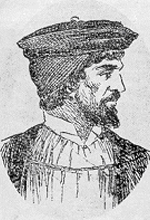João Vaz Corte-Real
| João Vaz Corte-Real | |
|---|---|

João Vaz Corte-Real in a 19th-century drawing
|
|
| 1st Captain-Donatário of Angra | |
|
In office 1474–1496 |
|
| Monarch | |
| Preceded by | Jácome de Bruges |
| Succeeded by | Vasco Anes Corte-Real |
| Constituency | Angra |
| 1st Captain-Donatário of São Jorge | |
|
In office 1474–1496 |
|
| Succeeded by | Vasco Anes Corte-Real |
| Constituency | São Jorge |
| Personal details | |
| Born |
João Vaz Corte-Real 1420 |
| Died | 1496 |
| Citizenship | Kingdom of Portugal |
| Nationality | Portuguese |
| Spouse(s) | Maria de Abarca |
| Children |
Miguel Corte-Real Vasco Anes Corte-Real Gaspar Corte-Real |
| Religion | Roman Catholic |
João Vaz Corte-Real (Portuguese pronunciation: [ʒuˈɐ̃w̃ vaʃ ˈkoɾt(ɨ) ʁiˈaɫ]; c. 1420 – 1496) was a Portuguese sailor, claimed by some accounts to have been an explorer of a land called Terra Nova do Bacalhau (New Land of the Codfish), speculated to possibly have been a part of North America. For his efforts, Corte-Real was offered the Donatário-Capitancies of São Jorge and Angra, respectively.
A member of the Corte-Real family, João Vaz was the father of Miguel and Gaspar Corte-Real, who some claim accompanied him on his voyage. Fragmentary evidence suggests the expedition in 1473 was a joint venture between the kings of Portugal and Denmark, and that Corte-Real accompanied the German sailors Didrik Pining and Hans Pothorst, as well as (the possibly mythical) John Scolvus.
The claim that he discovered Terra Nova do Bacalhau (literally, New Land of the Codfish) originated from Gaspar Frutuoso's book Saudades de terra from around 1570-80. There is speculation that this otherwise unidentified isle was Newfoundland. Frutuoso further suggested that Corte-Real was granted part of Terceira because of this discovery. This is contrasted by his contemporary grant which says nothing about any discovery, but explains his grant with the "expenses he had incurred" and "services rendered". Because of the lack of corroborating evidence, the claims of discovery remain entirely speculative.
It is known that Corte-Real was originally granted the island of São Jorge in the archipelago of the Azores in 1472, which he held until 1474. From this point onward he was granted the captaincy of Angra on Terceira by the Infanta Beatrice, Duchess of Viseu, and approved by the King, following the disappearance of Jacome de Bruges. Bruges was the original Captain-Donatário, but following his disappearance, the King had divided the island between Angra and Praia, granting Praia to Álvaro Martins Homem, while Corte-Real obtained Angra. He took-up residence in the burgh and set about promoting its settlement, but the division of the island into two Captaincies did not assist the island's growth.
...
Wikipedia
